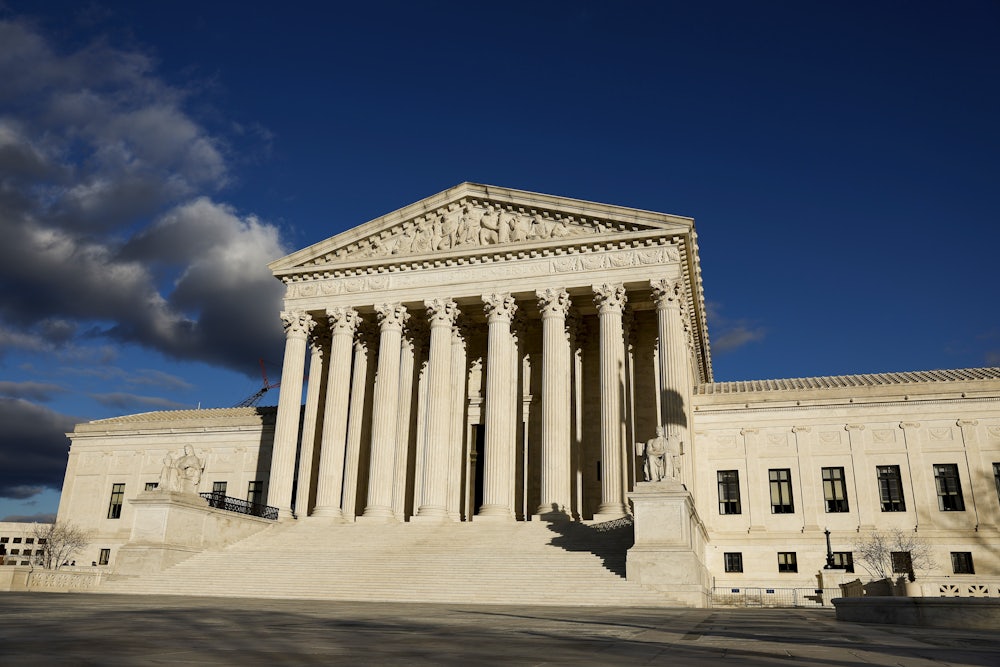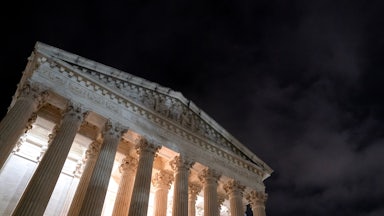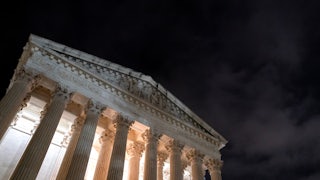Liberals hoping to stymie an ultra-right, ultra-activist Supreme Court have one option that hasn’t garnered the attention of institutional makeover proposals such as expanding the court or imposing term limits: Supreme Court ethics reform. It may not be as sexy as the idea of a 13-member court, but tightening judicial ethics, conflict of interest, and good practice and procedure standards would be more constructive, more likely to resonate with the public, and carry far more potential to attract broad congressional support.
How would this come to be? Reformers would first have to unite around legislation to end Supreme Court justices’ anomalous status as the only federal judges (or federal officials) who are not subject to an ethical code of conduct. There is good news on that front: Large, bipartisan popular majorities, prominent conservative legal luminaries, and even political leaders favor plugging that gaping loophole in the law. It may not be popular with the court’s conservative bloc, but so be it: Their resistance will telegraph their zest for aggrandizing their power without check. Meanwhile, reformers can take the high ground by spotlighting the justices’ zeal for deploying their unchecked power to gut or cancel popular economic, health, safety, environmental, equal opportunity, workplace fairness, fiscal stability, and democratic governance legal safeguards prized by broad constituencies of everyday Americans. Finally, traction for ethics legislation, which the conservative justices plainly fear and loathe, could induce at least some of them to trim their activist sails.
Here’s the problem: Supreme Court ethics reform, its appeal notwithstanding, is not going anywhere. And it will not go anywhere as long as Republican leaders—with some just cause—perceive liberals’ ethics flag-waving as simply a partisan excuse for thwacking conservatives, in particular Justice Samuel Alito, Justice Clarence Thomas, and Thomas’s far-right firebrand spouse, Ginni Thomas. To gain traction, backers of Supreme Court ethics reform must convincingly market their ideas as a credibly bipartisan initiative and craft a proposal that is workable as well as politically salable.
Happily, we’re off to a good start in the form of a new book by Ninth Circuit federal Judge M. Margaret McKeown, Citizen Justice: The Environmental Legacy of William O. Douglas, Public Advocate and Conservation Champion. As signaled by the title, the book spends most of its 234 pages documenting how Justice Douglas, while performing his day job on the nation’s highest court, simultaneously made himself, as Douglas Brinkley’s back-jacket blurb proclaims, “the gold-standard conservation activist from the 1930s to the 1970s, by promoting wilderness values and public lands preservation from Arctic Alaska to the Allagash of Maine.” But woven within this account, McKeown elaborates a second theme, that Douglas pursued his environmentalist agenda in incessant defiance of ethics constraints—norms embedded in professional canons, entrenched judicial conventions, and federal statutes.
McKeown details Douglas’s “full-on lobbying efforts at the highest levels.” His modus operandi, she observes, “was not an occasional letter, visit, or call to the halls of power [but rather] frequent and persistent until he succeeded.” Drily, McKeown notes that “it is hardly a surprise that his lobbying efforts carried weight”—with Kennedy-Johnson Interior Secretary Stewart Udall, in particular, since Douglas “participated in multiple Supreme Court decisions in which Udall, in his official capacity, was a named party.”
As McKeown chronicles,
Douglas is hardly the only member of the federal judiciary to have repeatedly
engaged in political moonlighting. But Douglas’s “signature style of advocacy”—a “sustained and intensive lobbying before Congress and the
federal agencies on a singular cause that implicated cases before the
judiciary”—absolutely broke the mold.
It is hardly surprising
that Douglas’s ethics misconduct would catch McKeown’s critical eye. She once chaired
the federal Judicial Conference Codes of Conduct Committee, a post to which she
was appointed by Chief Justice Roberts. McKeown’s
account could prove helpful to reformers seeking to channel rising public
skepticism about the justices’ partisan impartiality into momentum for a robust
reform initiative, in two ways.
First, the book illuminates the fact that Supreme Court ethics reform is not some off-the-cuff Democrat ploy; rather, it will close a loophole that appointees of both parties have exploited for centuries—multiple justices, eminent liberals no less than conservatives, have broached conflict-of-interest lines between judging and politicking. In particular, the ostentatiously liberal Douglas’s egregious misadventures credibly portray him as the poster child for the kind of ethical breaches that cry out for Supreme Court justices to be subjected to the same code of conduct with which their lower court colleagues have functioned comfortably for decades.
Moreover, as McKeown details in her book, as well as a December 2021 Yale Law Journal online article in which she expanded on her ideas, the foundation structure for a new reform effort is already in place. While there may be no comprehensive code of conduct applicable to Supreme Court justices, there are ethics provisions governing lower courts on the books already, which, if complied with, could go a long way toward bringing errant justices’ comportment into line with public expectations. In this way, new ethics legislation may be cast as a measure that fills in gaps and strengthens the architecture of the judiciary instead of burning it to the ground.
Second, as McKeown chronicles, the historical record undermines the justices’ insistence that a mandatory code of conduct would either hamper their ability to function or encourage the notion that such rules would be an unconstitutional invasion of the court’s independence. The court has consistently accepted and claimed to comply with ethics requirements that Congress has made applicable to it, as well as with the code of conduct promulgated for lower courts by the Judicial Conference.
In 1991 and 1993, responding to heightened public pressure, then–Chief Justice William Rehnquist orchestrated written public statements detailing how the court interprets and will apply to its members ethics code provisions governing salary-supplementary outside compensation in a “resolution” and, on recusal, in a “Statement of Recusal Policy.” The latter went beyond the Judicial Conference code language, by specifying that individual justices must “recuse from all cases in which … firms [appear before the court] in which our relatives are partners, unless we have received from the firm written assurance that income from Supreme Court litigation is, on a permanent basis, excluded from our relatives’ partnership shares.”
In his 2011 annual Year-End Report on the Federal Judiciary, Chief Justice Roberts asserted that he and his colleagues “follow the same general principles respecting recusal as other federal judges,” even though underscoring that their acceptance is “voluntary.” Roberts marshaled the justices’ voluntary embrace of these standards as evidence that codifying in law their application to the court is unnecessary and/or unconstitutional.
But history cuts against Roberts’s defense of his court’s exemption from mandatory controls. While he and his colleagues assert fidelity to legal ethics requirements in principle, they do not always or uniformly comply in practice. Hence his contention that enacting an enforceable code would have no real-world benefit comes up short. More to the point, the fact that Supreme Court justices have long, for the most part, as McKeown notes, adhered to legal requirements prescribed by Congress and the Judicial Conference belies his insinuation that, if made mandatory, such rules would interfere with the court’s work.
The long history of judicial ethics laws also undermines the current justices’ contention that new restrictions could unconstitutionally invade the court’s independence. Statutory ethics restrictions for the court were enacted as long ago as 1792, “when,” McKeown relates, Congress mandated recusal for all federal judges and justices, “in cases where a judge has an interest or has previously served as a counsel for a party,” and as recently as April 2022, when President Biden signed into law a Courthouse Ethics and Transparency Act, which requires federal judges and justices to file within 45 days reports on securities trades and to post their financial disclosure reports on a searchable online database.
No one, on or off the court, has suggested that its members’ voluntary compliance with enacted ethics measures has thrown a monkey wrench into the court’s functioning. Moreover, deference to long-standing practice has been a staple of constitutional interpretation at least since Chief Justice John Marshall famously rejected, in 1819, a constitutional challenge to the Bank of the United States, partly on the ground that a constitutional claim that would reshape “the respective powers of those [branches] who are equally representatives of the people [should ordinarily] be put at rest by the [established] practice of the Government.”
While McKeown’s expert historical survey of the judicial ethics landscape could thus be helpful to current reformers, there are aspects of her analysis that disregard why, as Forbes magazine reported, even before the court’s summer 2022 obliteration of long-standing abortion, environmental, and voting rights precedents, more than 60 percent of Americans “view the Court as politicized [and] partisan.” She casts Douglas’s immersion in politics as a thing of the past, which “today would find little traction.” In her Yale Law Journal article, she downplays the current drive for tightening judicial ethics controls, at one point insisting that “modern incidents of partisan extrajudicial entanglement conduct pale in comparison to the overt political entanglements” common in the first six decades of the twentieth century.
She acknowledges that “the question of the Supreme Court as a political institution certainly [has] heated up, [and] “even the Justices themselves are joining the debate.” But she concludes, “While such current debates are important, … they clearly appear relatively minor in the shadow of the ethics dilemmas of centuries past.… It is not pollyannaish to suggest that sensitivity about political involvement and the nature of extrajudicial activities in light of historical realities indicates an optimistic trend line.”
McKeown’s rosy-colored view of our current moment runs counter to the trend line of public take on the court’s impartiality and freedom from political and partisan taint. It may be that this discrepancy can be written down to the fact that McKeown is examining a different problem. “Extrajudicial activities,” such as the penchant of Douglas and his contemporaries and predecessors to moonlight as advocates are not why a September 2022 Pew survey found that 53 percent of Americans—an unsurprising 70 percent of Democrats and a surprising 37 percent of Republicans—believe that the justices “are doing a poor or only fair job of keeping their political views out of how they decide major cases.”
And errant off-the-court meandering of the sort that defined Douglas’s is not what Justice Elena Kagan had in mind when, just prior to the court’s current term, she leveled an unprecedented public fusillade at her conservative colleagues—confirming that “people have a right” to harbor skepticism about justices who “don’t act like courts” and admonishing that “the court shouldn’t be wandering around just inserting itself into every hot button issue in America, and it especially, you know, shouldn’t be doing that in a way that reflects one ideology or one … set of political views over another.” Nor are extrajudicial misdeeds what drove 72 percent of respondents in a March 2022 C-SPAN poll to favor adoption of a code of ethics for the Supreme Court, like that in place for lower federal courts. In short, the current spike in skepticism about the court’s impartiality and support for ethics reform arises from what the conservative justices are doing when they have their robes on—how they are doing their day job.
The most plausible vehicle for a credibly bipartisan initiative would build on a one-page “Supreme Court Ethics Act,” introduced in the last Congress by Senator Chris Murphy and by Representative Hank Johnson. This bill would simply direct the Judicial Conference to issue a code of conduct applicable to Supreme Court justices as well as lower court federal judges. If such a bill were to pass, it would address at least one of the flash points in the current furor. The existing Judicial Conference Code requires lower court judges to recuse from “any proceeding in which his impartiality might reasonably be questioned,” requiring recusal if “the judge or the judge’s spouse … is known by the judge to have an interest that could be substantially affected by the outcome of the proceeding.” A law subjecting Supreme Court justices to a code of conduct, substantially mirroring the existing Judicial Conference code, could precipitate reversal of Justice Thomas’s refusal to recuse from cases involving his spouse’s efforts to overturn the 2020 election. Enactment of such a bill would also give the Judicial Conference’s prescriptions the force of law and the blessing of Congress, which would surely encourage all judges and justices to take them seriously.
The Murphy-Johnson bill contained a proviso that the Judicial Conference code could have different provisions for “different categories” of judges or justices. That proviso was designed to deflect one of Chief Justice Roberts’s main arguments against ethics legislation covering the Supreme Court, namely, that the justices have unique concerns, different from those of lower court judges. A better way of mooting that contention, and muting constitutional separation of powers vulnerability, would be to assign the Supreme Court itself the job of promulgating the conduct standards for its members. Taking that route could also likely reduce enforceability concerns; it seems probable that justices would be especially disinclined to evade rules they had crafted for themselves.
But regardless of changes in the substance of existing judicial ethics standards, the primary benefit of a simple code of conduct initiative would be political—its prospects for gaining legislative traction and stimulating wide public support would get the attention of the justices.
There is good reason to believe that such a bill could attract Republican support. In February 2021, Senator Lindsey Graham of South Carolina co-signed, with Rhode Island Democrat Sheldon Whitehouse, a joint letter to the chief justice, asking, among other pointed questions, “What plans, if any, does the Court have to adopt a code of ethics?” and “If it has no such plans, what justifies the Court in having a lower disclosure standard than the other branches of government?” Five months later, Louisiana Republican John Kennedy co-authored, with Whitehouse, a similarly worded letter to Attorney General Merrick Garland noting that federal judicial disclosure requirements are “significantly less stringent” than those adopted by the legislative and executive branches and that “even those requirements do not formally apply to the justices of the Supreme Court.”
Congress’s April 2022 enactment of the above-noted Courthouse and Transparency Act, by overwhelming majorities in both houses, suggests that Republican sentiment favoring some measure of Supreme Court ethics reform could extend much further. Another good omen could be the successful negotiation of legislation substantially strengthening the Electoral Count Act, led by Senators Joe Manchin of West Virginia and Susan Collins of Maine. This bipartisan success story, strongly opposed by election-denier Republicans, demonstrates that a critical mass of Republicans in Congress can buy into good government, pro-democracy legislation, a frame that could credibly fit a Supreme Court code of conduct proposal.
Outside of Congress, prominent Republicans and conservatives have voiced support for such a measure. In May 2022, Federal District Judge Reggie Walton, a George W. Bush appointee, told a conference attended by other federal judges that it is “unimaginable that we have a segment of our federal judiciary that’s not subject to an ethics code.” Judicial ethics expert Gabe Roth recently testified to the Senate Judiciary Committee that, “when I speak to lower court federal judges, almost always off the record, I hear their frustration that the Supreme Court is neglecting its responsibility” to adopt a code of conduct. In November 2021, Nicholas Rostow, former senior official in the Reagan and Bush administrations, wrote in Roll Call that “the Supreme Court needs an ethics code,” noting that such codes “have already proved to be effective guardrails” for Congress and the executive branch, and would be “likely to attract bipartisan support—including at least 60 votes in the Senate to avoid a filibuster.” Rostow wrote on behalf of an organization of prominent conservative and libertarian lawyers, which includes senior legal officials from the Reagan and both Bush administrations.
The bottom line: Republican politicians could find it difficult to oppose a commonsensical notion enjoying broad public support, including from their own constituents. It would change the court-reform dynamic in significant ways by pushing it ahead of less publicly popular ideas like court-packing. Perhaps the biggest reason for any lawmaker to pursue this path is that it aligns with the interests of their branch of government and the constituents who elected them to Congress: The enactment of a Supreme Court code of conduct, or even a serious effort to enact such a code—including, say, Senate passage and respectable House Republican support—would, in and of itself, shift the balance of political power between Congress and a Supreme Court that now fancies itself to be the superlegislature supreme.










